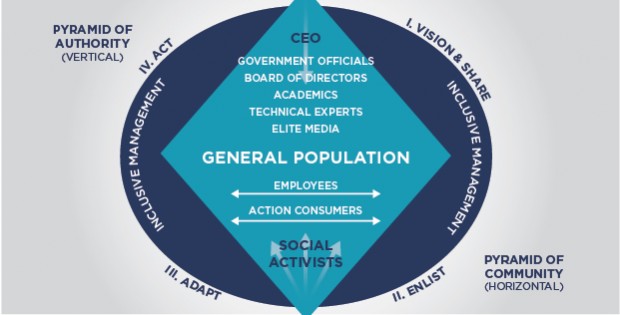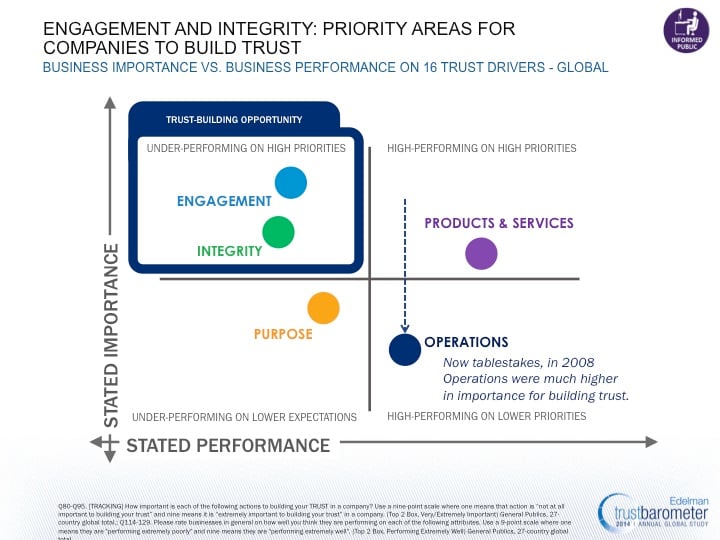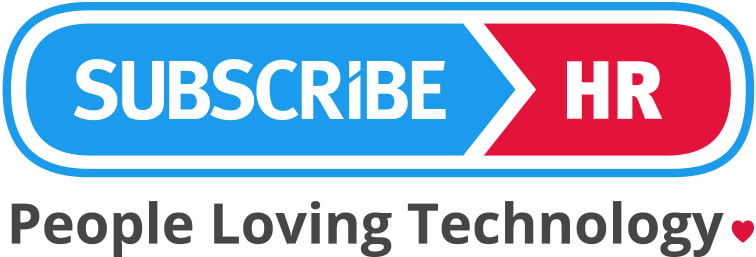Times they are a changing! In fact, the only thing you can really be sure of, is change itself. If doing business, and doing it well in the Human Era is predicated on building trust and trusted connections, how do we go about doing exactly that in a ‘Human Era’ context?
The Merriam Webster Dictionary defines ‘Trust’ in the following way: ‘A belief that someone or something is reliable, good, honest, effective, etc.’
The most trusted source for rigorous research on trust in business, is Edelman. Edelman have been conducting their annual research on trust for 14 consecutive years. As part of their most recent survey, they reached 33,000 people (27,000 General Public and 6,000 Informed Public respondents) in 27 markets around the world. Their survey evaluated the trust of participants in institutions, credible sources/channels and on specific issues and perceptions impacting trust in business and government.
Based on the results of their 2014 survey, Edleman advises ‘that trust is an asset that enterprises must understand and properly manage in order to be successful in today’s complex operating environment. Unlike reputation, which is based on an aggregate of past experiences with a company or brand, trust is a forward facing metric of stakeholder expectation.’
The results of Edelman's Trust Barometer for 2013, indicated that 82% of people don’t trust business leaders to tell the truth, and Gallup continues to report 70% of employees are disengaged at work.
These statistics are quite alarming, yet they can also be viewed as a great opportunity for organisations to reframe their values equation and, if willing to take the time to do the work, raise their game and place themselves ahead of the competition.
In a world of constrained resources and growing stresses, compromise and considered choice are required for forward progress. This forward progress needs to be based on values and followed up with the commitment to creating greater societal value through business activities. This means that the creation of value is no longer measured simply in dollar terms, nor is it the sole responsibility of the finance function to create value in these terms. The concept of what constitutes value is becoming much broader, much more considered, much more inclusive, and much more important.
If you've been reading our other recent blogs, it may well feel like we're repeating ourselves. However, if you look at the research, no matter which angle you approach it from, multiple sources are all singing the same song.
Value(s) creation is now the responsibility of everyone, from the CEO to Marketing, Human Resources and the entire employee population (as well as other third parties that organisations interact with). No longer are individuals, departments, customers and suppliers being viewed as separate entities, but more and more as part of the whole. Context setting, value creation and values articulation have well and truly become a 'team sport.'
According to Edelman’s Trust Barometer for 2014, ‘context sets the stage, value is the benefit to all, and values guide the way in which benefits will be achieved.’

The interconnectedness of our global economy, coupled with our hyperlinked social media oriented communication, means that the actions (as well as the inactions) of businesses are available and reacted to in real time. In the current operational reality, context, values and value have become essential ingredients to success, and they're essentially on display 24/7.
For companies looking to build or restore trust, the 2014 Edelman Trust Barometer offers some brilliant and meticulously researched pathways that can lead your organisation towards success, identifying 16 attributes that build trust. These attributes are measured against both how important they are to building trust in business, and how business is perceived as performing against each attribute.
16 Essential Ingredients for Building Trust in Business
Engagement
- Listens to customer needs and feedback
- Treats employees well
- Places customers ahead of profits
- Communicates frequently and honestly on the state of business
Integrity
- Has ethical business practices
- Takes responsible actions to address an issue or crisis
- Has transparent and open business practices
Products and Services
- Offers high quality products and services
- Is an innovator of new products, services or ideas
Purpose
- Works to protect and improve the environment
- Addresses society’s needs in its every day business
- Creates programs that positively impact the local community
- Partners with NGOs, Government and third parties to address societal needs
Operations
- Has highly regarded and widely admired top leadership
- Ranks on a global list of top companies
- Delivers consistent financial returns to investors
If your organisation is not operating at this level, this is a great list to aspire to. If you’re looking for the most beneficial ways to build trust within your organisation, both integrity and engagement should be the priority areas for you to focus on. The 2014 Edelman report indicates that most organisations are under performing in these areas. It also indicates that operational excellence, purpose and products and services continue to remain towards the bottom of the list for building trust in business.

For a really great example of how a CEO used these key ingredients and embodied Human Era characteristics to build trust when he started a new role, read this article. It really illustrates how building trust and living values can translate to a better, happier, more productive workplace that generates increased value (including dollar) for all involved.
Given these results, it is important for HR Professionals to pause for a moment of reflection in the context of the ‘what, how and why’ when offering strategic input to Senior Management as the business landscape evolves. The above list of 16 attributes offers HR Professionals a roadmap for a total strategic and operational transformation.
Here at Subscribe-HR, we recognise that whilst there’s a great deal of fantastic research and information available regarding the essential and most effective ways to do business in The Human Era, few of you actually have time to go through all the research and information yourself. To make it easier for HR professionals to evolve their organisations using Human Era benchmarks, we’re distilling the essence of our research of leading edge Human Era strategies, processes and behaviours, into simple, yet powerful reference documents for you to use.
The first document in this series 'Essential Human Era Strategies for Building Trust,' will be available with Part 2 of this blog so stay tuned.
Credit: The images used in this blog are taken from the Edelman 2014 Trust Barometer Global Results Presentation and the Edelman conversation about Stakeholder Engagement on the on the Edelman website.

